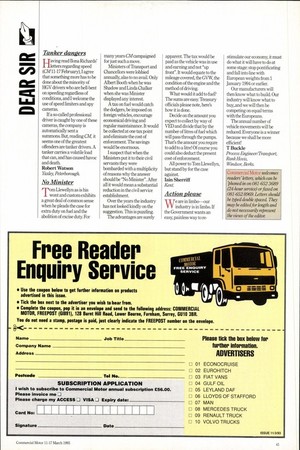No Minister
Page 43

If you've noticed an error in this article please click here to report it so we can fix it.
rrom Llewellyn as is his 1 wont and custom exhibits a great deal of common sense when he pleads the case for extra duty on fuel and the abolition of excise duty For many years CM campaigned for just such a move.
Ministers of Transport and Chancellors were lobbied annually, alas to no avail. Only Albert Booth when he was Shadow and Linda Chalker when she was Minister displayed any interest A tax on fuel would catch the dodgers, be imposed on foreign vehicles, encourage economical driving and regular maintainance. It would be collected at one tax point and eliminate the cost of enforcement. The savings would be enormous.
I suspect that when the Ministers put it to their civil servants they were bombarded with a multiplicity of reasons why the answer should be "No Minister". After all it would mean a substantial reduction in the civil service establishment Over the years the industry has not looked kindly on the suggestion. This is puzzling.
The advantages are surely apparent The tax would be paid as the vehicle was in use and earning and not "up front". It would equate to the mileage covered, the G'VW, the condition of the engine and the method of driving What would it add to fuel? The sums are easy. Treasury officials please note, here's how it is done.
Decide on the amount you expect to collect by way of VED and divide that by the number of litres of fuel which will pass through the pumps. That's the amount you requre to add to a litre! Of course you could also deduct the present cost of enforcement.
All power to Tom Llewellyn, but stand by for the case against lain Sherrill Kent.
















































































